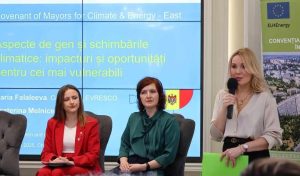Case studies, District heating, Municipal buildings and facilities, Others, RES, Residential buildings, Street lighting, Transport
Women Take the Lead on Local Climate Action in Moldova

Over 30 women from local authorities, civil society, and community organisations across Moldova gathered for a two-day “Women and Climate Change” training organised by the Covenant of Mayors for Climate and Energy (CoM East). The event underscored women’s essential role in building climate resilience and promoting sustainable local development.
Empowering Local Leaders through Knowledge and Collaboration
The training addressed the disproportionate impact of climate change on women, especially in rural and vulnerable communities, and highlighted how gender-responsive policies and actions can lead to more sustainable outcomes.
During the opening session, Irina Plis, National Expert for the Covenant of Mayors in Moldova, emphasised that the inclusion of women in climate strategies is both a matter of justice and a requirement for effectiveness:
“It is well-known that women, especially those in vulnerable communities, feel the effects of climate change more acutely due to gender inequalities. Their involvement in adaptation strategies is not just a matter of equity, but also a necessity for effective and sustainable solutions.”
Carolina Novac, Secretary of State at the Ministry of Energy, spoke about the integration of gender and sustainability in national energy policy:
“Women are encouraged to study and work in STEM fields to contribute to the development of sustainable solutions. Starting in 2027, local authorities will implement Sustainable Energy and Climate Action Plans (PAEDC) to strengthen community resilience.”
Marina Lungu, interim head of the climate change policy section within the Ministry of Environment, called for inclusive climate policies:
“Women are often the most exposed to the impacts of climate change. At the same time, women are also the driving force for change, playing a crucial role in finding sustainable and innovative solutions to protect the environment and build a more equitable world. In this context, it is very important that national policy documents include gender equality components to combat inequalities and ensure that all people have equal access to opportunities and resources.
From Theory to Action: Local Experience and Solutions
The first day of the training focused on the theoretical foundations of climate adaptation, the gender dimensions of climate impacts, and community engagement strategies. Experts Maria Falaleeva (Ireland) and Ecaterina Melnicenco (Moldova) led sessions on identifying climate risks and integrating gender into local energy and climate planning, Victoria Ivancioglo, project manager at UNDP-Moldova, spoke about local practices for involving the community in addressing climate issues.

The second day was hands-on, with participants engaging in group work, brainstorming project ideas, and sharing experiences from their municipalities. Veronica Herța, Executive Director of Green City Lab Moldova, introduced practical local initiatives for greener cities, while Lilia Curchi, communications expert, delivered a session on effective citizen engagement.
Participants’ Insights: Turning Training into Local Impact
The energy and enthusiasm of the participants reflected their determination to return to their communities with concrete actions:
“After this event, I’m going home with many ideas and project models that can be implemented in our community. We will carry out energy and climate-related activities and promote them to inspire other communities as well.” – Veronica Vrânceanu, Sireți City Hall.
“In Nisporeni, we have already implemented 70% of our Local Energy and Climate Action Plan. One project idea identified here is rainwater harvesting. We can start by collecting rainwater from the roof of Mircea Eliade Theoretical High School and using it to irrigate green spaces.” – Olga Batâru, Deputy Mayor, Nisporeni.
“I’m heading to Ungheni with enthusiasm and determination to engage in sustainable energy projects. I will work on attracting financial resources for initiatives aimed at reducing CO₂ emissions and improving energy efficiency.” – Rodica Guțu, Civic Activist, Ungheni.
“In the Mereni community, I will focus on promoting responsible behaviour, developing clear communication strategies, and integrating the gender dimension into climate initiatives.” – Natalia Procopii-Scobioală, AO Genesis, Mereni, Anenii Noi.
“One issue we face is the rapid spread of ragweed, an invasive plant that affects public health. We will integrate control methods into our local action plan.” – Eugenia Gobjilă, Volintiri village, “Simion Ciapchii for Volintiri” Foundation.
Women as Catalysts for Local Climate Action
This training reaffirmed that women are key agents of change in climate action. Their leadership, experience, and local knowledge are crucial for creating inclusive and effective climate strategies. Through collaboration, innovation, and determination, these women are transforming climate challenges into opportunities for sustainable development at the local level.





